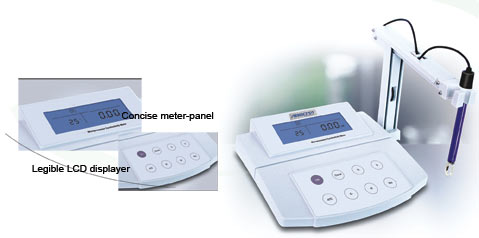
The conductivity meters measure
the capacity of ions in an aqueous solution to carry electrical
current. Since the ranges in aqueous solutions are usually
small, the basic units of measurements are milliSiemens/cm
(mS/cm) and microSiemens/cm (ÁS/cm).
Conductivity is used widely to determine the
level of impurities in water supplies for domestic consumption
as well as industrial use. Industries that employ this method
include the chemical, semi-conductor, power generation, hospitals, food and beverage, mining, electroplating, pulp and paper, petroleum and marine industries.
Microprocessor-based
With a microprocessor chip inside and all components
of the apparatus jointed with SMT technology, the meter provides
high performance levels and good stability.
Adjustable Cell Constant
Adjusts the reading on the display to reflect
use of a cell with a constant.
Adjustable Temperature Coefficients
The TDS (Total Dissolved Solid) of certain samples, such as
alcohols and pure water, are affected by changes in temperature.
An adjustable temperature coefficient allows
the user to compensate for temperature changes on the solution
being measured.
Auto-Ranging
Meter automatically selects the appropriate range for measurement.
There is no need to change the dial, multiply values on the
display, or turn the potentiometer.
Temperature Compensation
A cell with a built-in temperature sensor allows the meter
to make adjustments to the conductivity readings based on
changes in solution temperature.
Large LCD Display
Large customized LCD with simultaneous display of the measured
value is easy to read.
Selectable cell constants let you use k=1 cells
for general purpose, k=0.1 cells for high purity water, or
k=10 cells for brines or other concentrated solutions.
|


